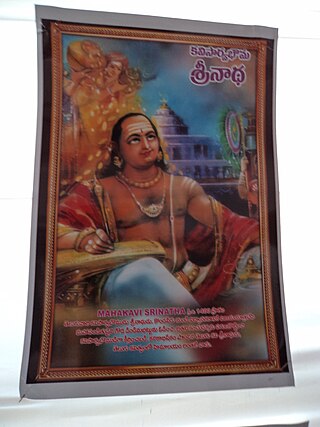
Srinatha was a well-known 15th-century Telugu poet who popularised the Prabandha style of composition.
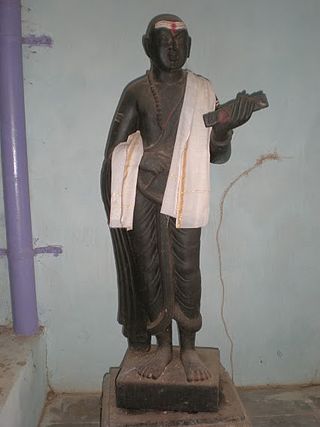
Bammera Pothana (1450–1510) was a Telugu poet best known for his translation of the Srimad Bhaagavatam from Sanskrit to Telugu. He was a Telugu and Sanskrit Scholar. His work, Srimad Bhagavatamu, is popularly called as Pothana Bhagavatam in Telugu.
Kadiri Venkata Reddy was an Indian film director, screenwriter, and producer who primarily worked in Telugu cinema. He is regarded as one of the most influential film directors in the history of Indian cinema. He directed 14 feature films and won three National Film Awards and a Filmfare Award South.

Lava Kusa is a 1963 Indian Hindu mythological film directed by C. S. Rao and his father C. Pullayya. The film was scripted by Sadasivabrahmam, Samudrala Sr. along with C. S. Rao and C. Pullayya. The film was produced by Sankara Reddy under Lalita Sivajyothi Films. Lava Kusa is the first full-length colour film of Telugu cinema.
Samudrala Raghavacharya, also known as Samudrala Sr., was an Indian screenwriter, lyricist, playback singer, director, and producer known for his works in Telugu cinema. Samudrala Senior made his screen debut in 1937, and known for his collaborations with Ghantasala. grand son samudrala srinivaas
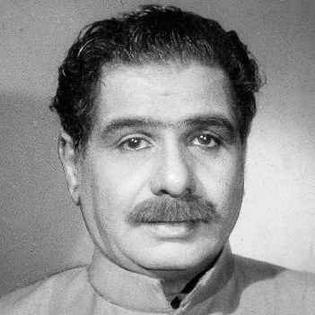
Vuppaladadiyam Nagayya Sarma, popularly known as Chittoor Nagayya, was an Indian actor, singer, music composer, and director known for his works in Telugu cinema, Tamil cinema, and Telugu theatre. Nagayya was one of the first multilingual filmmakers in India. Indian film journalist Baburao Patel described Nagayya as "The Paul Muni of India". Nagayya was considered the best character actor in South Indian cinema during 1940s and 1950s. In 1965, he became the first South Indian actor to receive the Padma Shri in Arts from the Government of India for his contributions to Indian cinema.

Tenali Ramakrishna is a 1956 Indian Telugu-language political drama film produced and directed by B. S. Ranga based on Ch. Venkataramaiah's stage play of the same name. Produced for the banner Vikram Productions, it stars NTR, Akkineni Nageswara Rao, V. Nagayya, Bhanumathi Ramakrishna, and Jamuna in key roles. Ranga handled the cinematography with his brother-in-law B. N. Haridas while P. G. Mohan edited the film. Viswanathan–Ramamoorthy composed the soundtrack and background score.

Pedda Manushulu is a 1954 Indian Telugu-language drama film produced and directed by K. V. Reddy. It stars Jandhyala Gaurinatha Sastry, Mudigonda Lingamurthy, Relangi, Vangara, Sriranjani Jr. in prominent roles. The film portrays corruption among so called respectable persons of the society. It was loosely based on The Pillars of Society, a 1877 play by famous Norwegian playwright Henrik Ibsen.
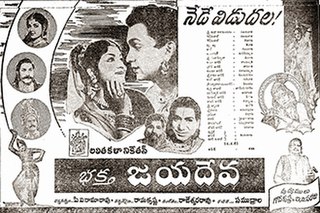
Bhakta Jayadeva is a 1961 Indian Telugu-language biographical film, based on the life of 12th Century Sanskrit Poet Jayadeva, produced by Komaravolu Narayana Rao, G. Paramdhama Reddy under the Lalitha Kala Nikethan banner and directed by P. V. Rama Rao, while Ramakrishna took care of direction supervision. It stars Akkineni Nageswara Rao, Anjali Devi and music composed by Saluri Rajeshwara Rao.

Tyagaiah is a 1946 Telugu-language film produced and directed by V. Nagayya It is based on the life of the saint Tyagaraja.
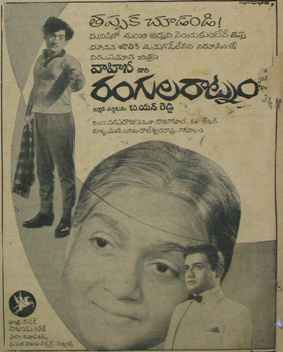
Rangula Ratnam is a 1966 Indian Telugu-language film directed and produced by B. N. Reddy under the banner of Vauhini pictures. The film stars Chandra Mohan, Vanisri, Anjali Devi and Baby Rekha. It is a social and political satire involving a middle-class family in the backdrop of politics and elections. The film won the National Film Award for Best Feature Film in Telugu and also won two Nandi Awards. B. N. Reddy introduced many stalwarts like Chandra Mohan, Vanisri, Rekha and Vijaya Nirmala as young artistes to the film industry with this movie.

Yogi Vemana is a 1947 Telugu-language biographical film produced and directed by K. V. Reddy. The story is based on the life of saint poet Vemana. V. Nagayya played the role of Vemana and also composed music and sang many poems and songs in this film exposing his multifaceted talents.

Sumangali is a 1940 Telugu-language film written, directed and produced by B. N. Reddy. The film stars V. Nagayya, A. S. Giri, Kumari and Malathi. The main concept of the film widow remarriage is inspired by Kandukuri Veeresalingam.
Jandhyala Papayya Sastry was an eminent Telugu writer and lyricist. He was popularly known as Karunasri because his writings expressively show compassion, one of the nine Rasas. His famous kavyas include Pushpa Vilapam and Kunthi Kumari.

Veeranjaneya is a 1968 Indian Telugu-language film directed by Kamalakara Kameswara Rao. It is a musical film released in 1968, starring Arja Janardhana Rao, Kanta Rao, Anjali Devi and S.V. Ranga Rao. The film was dubbed in Kannada as Veeranjaneya Katha in 1974.

Devata is a 1941 Indian Telugu-language drama film directed by B. N. Reddy. The huge success of this film led to the making of more films with the same title in 1964 by B. Padmanabham and in 1982 by D. Ramanaidu. The film was remade in Malayalam as Pavappettaval (1967).
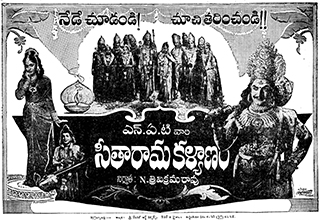
Sita Rama Kalyanam is a 1961 Indian Telugu-language Hindu mythological film directed by N. T. Rama Rao in his directorial debut. It stars N. T. Rama Rao, Haranath, Geetanjali, B. Saroja Devi, Kanta Rao, Sobhan Babu. The film was produced by N. Trivikrama Rao on 'National Art Theatres' banner. The music composed by Gali Penchala Narasimha Rao.
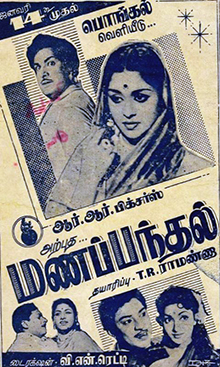
Manapanthal is 1961 Indian Tamil-language romance film, directed by V. N. Reddy, produced by T. R. Ramanna and written by Thuraiyur K. Moorthy, with music by Viswanathan–Ramamoorthy. The film stars S. S. Rajendran, S. A. Ashokan, B. Saroja Devi and E. V. Saroja, with P. Kannamba, V. Nagayya, Rama Rao, K. A. Thangavelu and M. Saroja in supporting roles. The film was simultaneously made in Telugu as Intiki Deepam Illale; both versions are based on the American film Sabrina (1954).
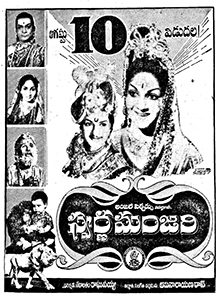
Swarna Manjari is a 1962 Indian Telugu-language swashbuckler film, produced by P. Adinarayana Rao under Anjali Pictures, and directed by Vedantam Raghavayya. It stars N. T. Rama Rao an Anjali Devi, with music composed by P. Adinarayana Rao. The film was simultaneously made in Tamil as Mangaiyar Ullam Mangatha Selvam.

Bhakta Raghunath is a 1960 Telugu-language biographical film, based on the life of Raghunatha dasa Goswami, produced by G. Sadasivudu under the G.V.S. Productions banner and directed by Samudrala Sr. It stars Kanta Rao, Jamuna and N. T. Rama Rao in a special appearance, with music composed by Ghantasala.














